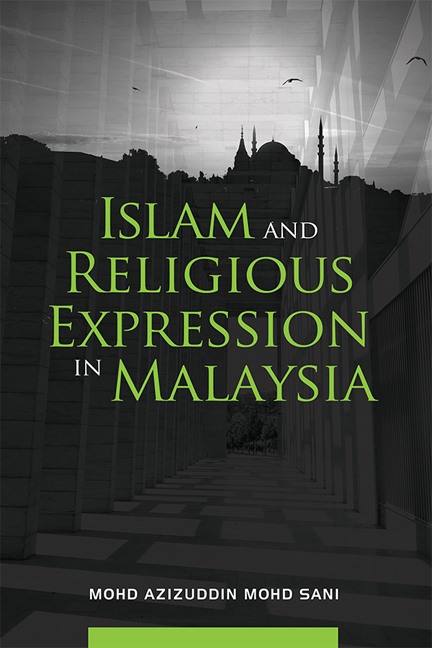Book contents
- Frontmatter
- Cantents
- Foreword
- Preface
- Acknowledgements
- List of Acronyms and Abbreviations
- 1 Freedom of Expression
- 2 Islamization Policy and Islamic Bureaucracy
- 3 Inter-Religious Expression
- 4 Intra-Religious Expression
- 5 Extreme Expression and Radicalization
- 6 New Malaysia under Pakatan Harapan
- 7 Conclusion: Seeking for a Genuine Freedom of Religious Expression
- Bibliography
- Index
- About the Author
- Frontmatter
- Cantents
- Foreword
- Preface
- Acknowledgements
- List of Acronyms and Abbreviations
- 1 Freedom of Expression
- 2 Islamization Policy and Islamic Bureaucracy
- 3 Inter-Religious Expression
- 4 Intra-Religious Expression
- 5 Extreme Expression and Radicalization
- 6 New Malaysia under Pakatan Harapan
- 7 Conclusion: Seeking for a Genuine Freedom of Religious Expression
- Bibliography
- Index
- About the Author
Summary
Religious Expression in Perspective
Freedom of expression is a fundamental liberty enshrined predominantly in the constitution of modern Western secular states, with every individual, regardless of his or her ethnicity, socio-economic standing, and religious belief, guaranteed the right to exercise such freedom. Setting this preconceived notion aside, practical implementation of freedom of expression is not totally absolute even to the staunch defenders of human rights. There is an ongoing debate and controversy surrounding the types and substances of the said expressions that warrant constitutional protection. Moreover, the extents and impacts of freedom of expression remain a contentious and divisive issue in many liberal societies. It is not an exaggeration to claim that considerable numbers of advocators of free expression who are willing to support certain controversial practices, including pornography and hate speech, stopped short of recognizing other practices, most notably religious expression. There is no doubt that the possibility of reaching unanimous consensus on this issue amongst civil society groups and activists is remote, albeit one should take note that religious freedom continues to be a dominant subject in public discourse over the last century. In relation to this, the issue concerned may also be examined from the perspective of whether religious expression would somehow inflict or affect political instability or dynamism in bringing political transformation in a country. Therefore, this book will analyse these debates from the context of religious expression in Malaysia.
It is argued that the ultimate goal of safeguarding racial and religious sensibilities continues to be the main barrier to exercising unhindered practice of religious expression in Malaysia. In fact, there is a tendency (and as often the case) for the state authority to exert strict and sometimes excessive legal and political control over the media, prohibiting any forms of provocative or offensive expressions that may harm religious sensitivity of groups or communities from being cited or disseminated in the country. Notwithstanding Islam's official status under the Federal Constitution (hereafter “Constitution”), publications or circulation of articles, including editorial pieces and public opinions, that may deemed offensive to Islam and other religious believers either, intentionally or otherwise, are strictly prohibited. No local media in the country, including those operated by the opposition parties, are exempted from complying with this policy directive.
- Type
- Chapter
- Information
- Islam and Religious Expression in Malaysia , pp. xi - xvPublisher: ISEAS–Yusof Ishak InstitutePrint publication year: 2020

